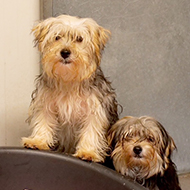
Six of 11 rescued puppies test positive for lethal disease.
The RSPCA has issued a warning to potential puppy buyers about the risks of buying imported animals after a number of puppies that were seized from a van died of parvovirus.
A total of 11 puppies were rescued by Nottinghamshire police from a van last month. Police suspect that they had been imported from Ireland to be sold on. Eight of the puppies tested positive for parvovirus and were given emergency veterinary treatment but, sadly, six died.
The five remaining puppies have now been either fostered or rehomed and are doing well, despite behavioural issues arising from their lack of socialisation early on in life.
Dr Samantha Gaines said: “We know that there are unscrupulous people out there who want to exploit the demand for dogs and are willing to take advantage of families who want to add a dog to their home. Sadly, this comes at the expense of the dogs.
“Puppies are being bred in poor conditions overseas and are taken from their mums too young, put into a van with lots of other puppies - the perfect breeding ground for nasty diseases and infections like parvovirus - before being travelled thousands of miles and imported into the country.
“Not only is this a major animal welfare issue for the dogs, but it also poses a significant public health risk. Most dogs have not had the correct vaccinations or health checks and could be bringing in serious diseases that could infect our own dog population or even be transferable to humans.”
The RSPCA’s #ForPupsSake campaign is calling on the UK Government to tackle the growing problem of puppy farming and importation. It demands greater enforcement at the borders to intercept illegally imported dogs and also wants to see the minimum age puppies can be brought into the UK increased from 15 to 24 weeks.
Image (c) Nottinghamshire Police and RSPCA Radcliffe Animal Centre.



 The Veterinary Medicines Directorate (VMD) is inviting applications from veterinary students to attend a one-week extramural studies (EMS) placement in July 2026.
The Veterinary Medicines Directorate (VMD) is inviting applications from veterinary students to attend a one-week extramural studies (EMS) placement in July 2026.